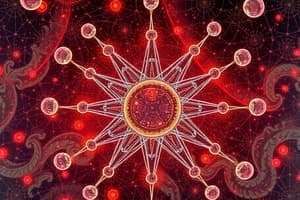Podcast
Questions and Answers
What are isotopes?
What are isotopes?
Atoms of the same element with the same number of protons but different numbers of neutrons
What is the significance of the atomic number in isotopes?
What is the significance of the atomic number in isotopes?
The atomic number determines the element, while the number of neutrons varies, leading to different isotopes of the same element.
How do stable and unstable isotopes differ?
How do stable and unstable isotopes differ?
Stable isotopes are stable and do not undergo radioactive decay, while unstable isotopes are radioactive and eventually decay into stable isotopes
What are the two main types of isotopes?
What are the two main types of isotopes?
What are some practical applications of isotopes?
What are some practical applications of isotopes?
What are isotopes used for in medical imaging and treatment?
What are isotopes used for in medical imaging and treatment?
How do isotopes contribute to oil and gas exploration?
How do isotopes contribute to oil and gas exploration?
In what way do isotopes aid in scientific research?
In what way do isotopes aid in scientific research?
How are isotopes involved in the development of nuclear weapons and defense applications?
How are isotopes involved in the development of nuclear weapons and defense applications?
What is the specific application of carbon-14 isotopes mentioned in the text?
What is the specific application of carbon-14 isotopes mentioned in the text?
Study Notes
Isotopes: Understanding the Different Types of Atoms
Isotopes are atoms of the same element that share the same number of protons but have different numbers of neutrons, resulting in variations in their mass number. They have almost the same chemical properties, but their nuclear properties may differ. There are two main types of isotopes: stable and unstable (radioactive). All elements have isotopes, and their properties make them useful in various applications, including diagnostics, treatment, nuclear energy, and carbon dating.
Key Aspects of Isotopes
-
Atomic Number: The number of protons in the nucleus of an atom determines the element, while the number of neutrons varies, leading to different isotopes of the same element.
-
Stable and Unstable Isotopes: Stable isotopes are stable and do not undergo radioactive decay, while unstable isotopes are radioactive and eventually decay into stable isotopes.
-
Natural and Artificial Isotopes: Most elements have naturally occurring isotopes, but some isotopes are man-made and artificially produced.
-
Isotope Discovery: The discovery of isotopes has been a worldwide effort, with more than 3,000 scientists in 27 countries contributing to the understanding of these atomic variants.
Applications of Isotopes
Isotopes have various practical applications in different fields, including:
-
Nuclear Medicine: Isotopes are used as tracers in medical imaging and treatment, helping doctors diagnose and treat diseases.
-
Oil and Gas Exploration: Isotopes are used to study the age and composition of rock formations, providing valuable information for oil and gas exploration.
-
Basic Research: Isotopes serve as essential tools in scientific research, helping scientists understand the properties of elements and the forces that govern their interactions.
-
National Security: Isotopes are used in the development of nuclear weapons and other defense applications, contributing to the security of nations.
-
Carbon Dating: Isotopes, particularly carbon-14, are used in carbon dating to determine the age of organic and inorganic materials.
In conclusion, isotopes are essential components of atoms, with their unique properties making them valuable in various applications. Understanding isotopes is crucial for advancing scientific knowledge and developing practical solutions in diverse fields.
Studying That Suits You
Use AI to generate personalized quizzes and flashcards to suit your learning preferences.
Description
Test your knowledge about isotopes, the different types of atoms that share the same number of protons but have varying numbers of neutrons. Learn about their applications in nuclear medicine, oil and gas exploration, basic research, and more.




